




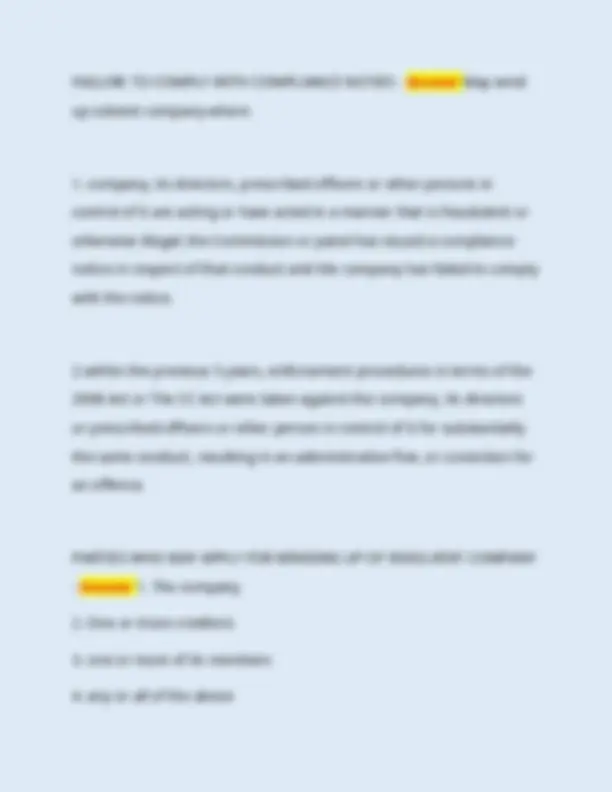



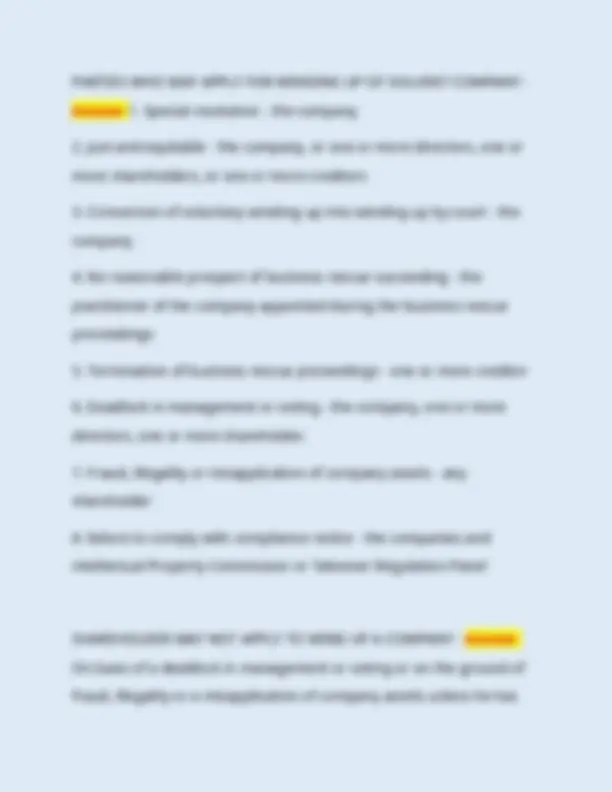
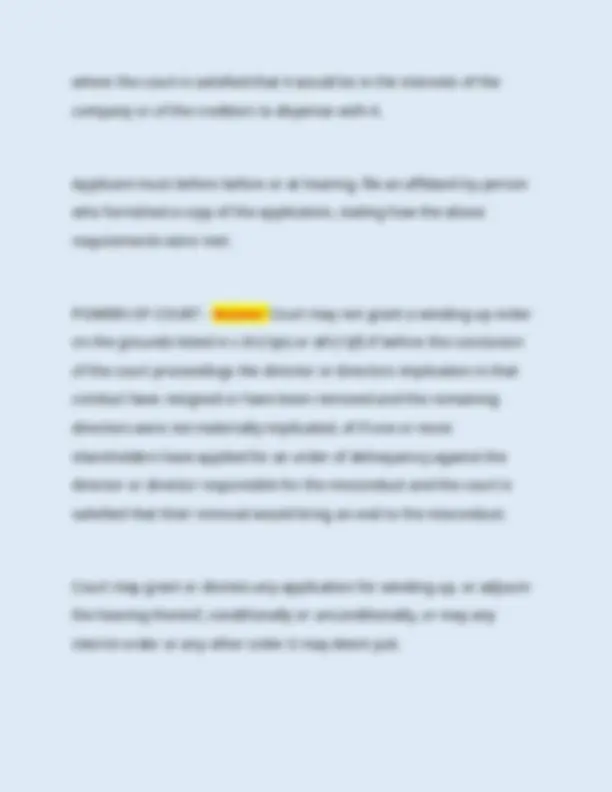



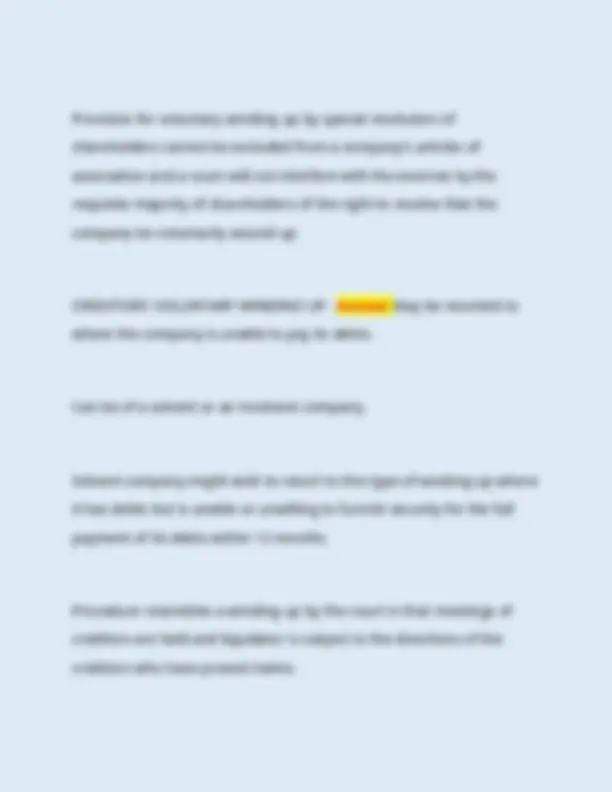










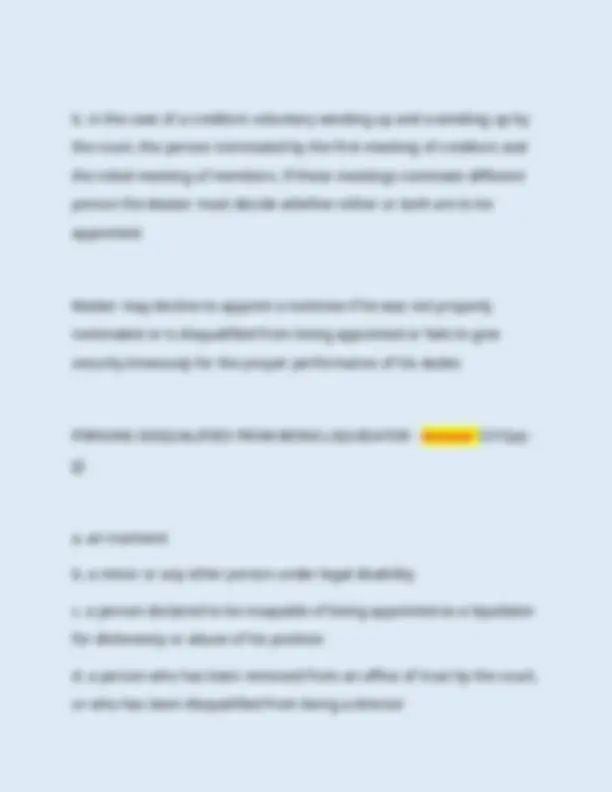





Study with the several resources on Docsity

Earn points by helping other students or get them with a premium plan


Prepare for your exams
Study with the several resources on Docsity

Earn points to download
Earn points by helping other students or get them with a premium plan
Community
Ask the community for help and clear up your study doubts
Discover the best universities in your country according to Docsity users
Free resources
Download our free guides on studying techniques, anxiety management strategies, and thesis advice from Docsity tutors
A comprehensive overview of winding up companies in south african law, focusing on the companies act 71 of 2008. It covers various aspects of winding up, including the different modes, grounds for winding up, and the parties who can apply for a winding up order. The document also includes exam questions with correct answers, making it a valuable resource for students studying company law.
Typology: Exams
1 / 36

This page cannot be seen from the preview
Don't miss anything!





























WINDING UP MEANS - Answer essentially the procedure by which a company's assets are sold, its debts are paid, and any money left over is divided amongst the shareholders according to their rights. WINDING UP OF COMPANIES IS REGULATED BY THE FOLLOWING LEGISLATIVE PROVISIONS - Answer 1. Section 79 - 81 of the Companies Act 71. Winding up of solvent companies
LOSS OF CAPITAL - Answer If 75% of its issued share capital has been lost or become useless for its business. INABILITY TO PAY DEBTS - Answer Unable to pay debt as described in S345. Cannot be relied upon if the company is solvent despite being unable to its debts. S345 - COMPANY DEEMED TO BE UNABLE TO PAY DEBTS IN THE FOLLOWING CASES - Answer 1. Creditor to whom company is indebted for at least R100 has left a demand for payment at company's registered office and the company has neglected for three weeks thereafter to pay, secure, compromise the claim to satisfaction of creditor.
if the oppression can be removed with some other remedy for example by interdicting the wrongdoers from continuing their oppression. NO REASONABLE PROSPECT OF BUSINESS RESCUE SUCCEEDING - Answer May windup solvent company that is in business rescue if the practitioner concludes that there is no reasonable prospect of the company's being rescued TERMINATION OF BUSINESS RESCUE PROCEEDINGS - Answer may find up a solvent company that has commenced business rescue proceedings if the proceedings have ended in the manner contemplated or it appears just and equitable in the circumstances for the company to be wound up. DEADLOCK IN MANAGEMENT OR VOTING - Answer May wind up solvent company where either of the following situations exist:
ONE OR MORE CREDITORS - Answer including contingent or prospective creditors. Creditor's claims need not equal or exceed any particular amount as it must in an application for compulsory sequestration. A contingent or prospective creditor is one whit a claim against the company which will only become enforceable in the future. Does not include loan of a preferent shareholder. ONE OR MORE OF ITS MEMBERS - Answer Or by person appointed as executor, trustee, liquidator, curator, or guardian in respect of a member who is decease, insolvent or under a disability. Membe rmay not apply unless he has been registered as such in the reigster of members for at least six months prior to the date of the application or unless the shares he holds have eveloped upon him through the death of a former holder.
Cannot be founded on the inability of the company to pay its debts. Application for winding up order on this ground can only be brought by the company itself (acting pursuant to a special, or perhaps a directors resolution) on one or more creditors of the company, the Master or a provisional or final judicial manager ANY OR ALL OF THE ABOVE PARTIES - Answer Application may be brought jointly by some or all of the parties mentioned above company, creditors and members THE MASTER - Answer May apply to convert a voluntary winding up into a winding up by the court. Only instance where Master may apply for a winding up of a company.
Reason why is usually to make available the procedure for examination and enquiry under ss417 and 418. Most probable ground for winding up on which the Master will base his application is the inability of the company to pay its debts A PROVISIONAL OR FINAL JUDICIAL MANAGER - Answer May bring application where the provisional order of judicial management is discharged. this provision does not preclude a creditor from applying for the winding up of a company under judicial management. Final judicial manager is obliged to apply for winding up if it appears to him that the company he is managing will not become a successful concern. Although judicial management provisions have been repealed this provision remains relevant to judicial managers appointed under the 173 act.
been a shareholder, or he and the party from whom he acquired the shares have been shareholders, continuously for at least six months immediately before the date of the application. STEPS PRIOR TO APPLICATION - Answer Section 346 (3) - (4A) Requirements
Must be accompanied by certificate issued by the Master not more than 10 days before the date of application to the effect that this security has been given. MASTERS REPORT - Answer Before presenting his application to court applicant must serve a copy on Master who may report to the court any facts which he has ascertained which may justify postponing or dismissing the application. NOTIFICATION OF CERTAIN INTERESTED PARTIES - Answer 1. Every registered trade union that represents any of the company employees
Act does not oblige court to make a provisional order and it may, if it deems it appropriate make a final order immediately, for instance where the issues have been fully ventilated and nothing has been suggested or put forward to indicate that further relevant facts would be forthcoming if a rule nisi were issued. Courts power to grant an application for winding up is discretionary, irrespective of the ground on which it is sought. Were court is face with the choice between business rescue and winding up the former must be preferred. Winding up is more appropriate than business rescue when dispositions made by the company may need to be set aside or where the company is involved in legal disputes, particularly pertaining to contracts such as lease of immovable property,that could simply be terminated by a liquidator, where there is a deadlock between the shareholders, or where there is a lack of up to date financial information about the company.
Court may not refuse a winding up order merely because the company has no assets or because its assets have been mortgaged to their full value. Where the company disputes allegations of f VOLUNTARY WINDING UP - Answer An insolvent company may be wound up voluntarily if it has adopted a special resolution to that effect and that resolution has been registered by the Commission in accordance with the formalities laid down in s Special resolution to wind up company must state whether the winding up is a members' voluntary winding up or a creditors' voluntary winding up. Solvent company may be wound up voluntarily if it has adopted a special resolution to this effect and filed it with the Commission.